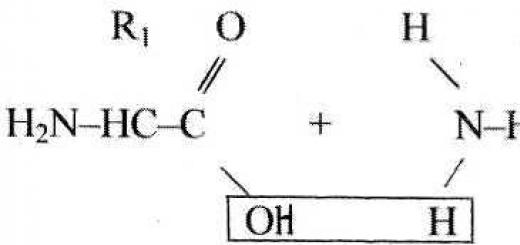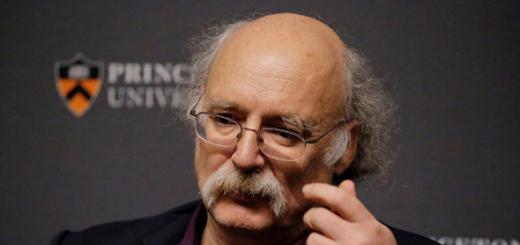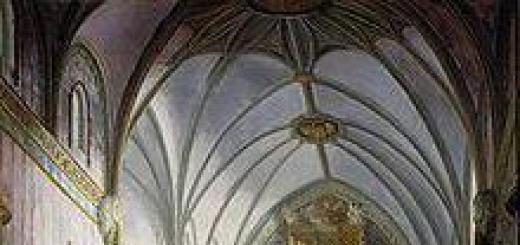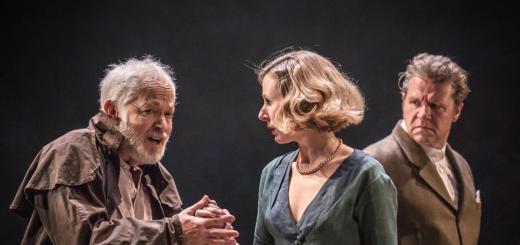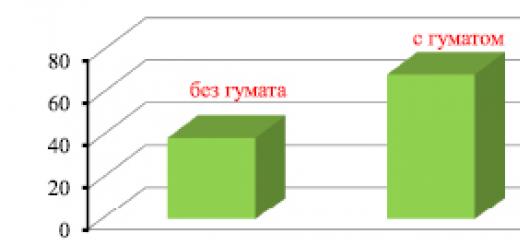The events of October 1917 caused and still cause conflicting assessments among contemporaries and subsequent generations. Immediately after the Bolsheviks came to power, all their political and ideological opponents were united in accusing the Bolshevik Party of usurping power, of a military coup, and of inciting a civil war in the country. The actions of the Bolsheviks were interpreted as the implementation of the narrow political goals of one party, which does not take into account the real state of affairs and whose program runs counter to both the national interests of Russia and the course of its historical development. The Bolshevik government was given several days or weeks to deal with the historical incident. Only later, when the existence of Bolshevik Russia became a real fact, were attempts made at more balanced assessments, when October 1917 was considered in the context of the entire history of Russia. According to the outstanding Russian philosopher N.A. Berdlev, who witnessed the dramatic events of 1917 and their consequences, “it was orthodox, totalitarian Marxism that managed to carry out a revolution in which Russia skipped over the stage of capitalist development, which seemed inevitable to the first Russian Marxists. And this turned out to be in agreement with Russian traditions and the instincts of the people.”
In Soviet historical science, October 1917 was considered as a natural stage in the evolution of Russian society, when the objective and subjective prerequisites for the Great October Socialist Revolution, which marked the beginning of Russia's transition to socialism, were evident. In the late 1980s - 1990s, in the context of a revision of the historical knowledge of Soviet times, assessments became widespread in the domestic literature, largely borrowed from Western anti-communist studies and boiling down to the fact that there were no real grounds for the revolution, except for the desire of the Bolshevik leaders seize power to satisfy their political ambitions and to conduct a socialist experiment.
Most serious modern historians believe that both of these stereotypes are unlikely to be justified. At the heart of Bolshevism was a thirst for the revolutionary renewal of Russia, associated with ideas about the dead-end nature of the development of the then world capitalism and the inability of European democracy to save humanity from the disastrous consequences of the world war. Russian and world antagonisms, different in their historical origin and social nature, were intertwined into such a complex knot that it was no longer possible to resolve it in the “usual” way. Possible alternatives to the Bolsheviks gaining power are assessed differently: the Western-style liberal-democratic path was not accepted by the broad masses of the people; the right-wing socialist parties of the Mensheviks and Socialist Revolutionaries missed the opportunity to implement the “middle path in the revolution of 1917”, combining the values of liberal democracy and Soviet power; An alternative to Bolshevism could be a military cadet dictatorship or chaos, anarchy, or the collapse of the Russian state. The Bolshevik Party saw a way out of the current tragic situation in the world proletarian revolution and, realizing that Russia was not economically and culturally ripe for socialism, called on the people to become the vanguard of the world revolution, in order to then, through the socialist transformations of Russian society, fit into European civilization. On the scale of Russia, this was a “conscious leap forward”, a new revolutionary path of modernization.
However, regardless of historical assessments, the October events of 1917 were of great importance for both Russian and world history. One of the most famous English researchers, who devoted many years to studying the history of Soviet Russia, E. Carr, wrote: “The Russian Revolution of 1917 was a turning point in the history of mankind, and it is likely that future historians will call it the greatest event of the 20th century. Historians will argue for a very long time and sharply disagree in their assessments of it, as was the case in their time with the Great French Revolution. Some will glorify the Russian Revolution as a historical milestone in the liberation of humanity from oppression, while others will curse it for its crimes and disaster. The Russian Revolution was the first open challenge to the capitalist system, which reached its apogee in Europe by the end of the 19th century. That the revolution broke out in the midst of the First World War and was partly a result of it is hardly a coincidence. The war dealt a blow to the international capitalist system that had emerged by 1914 and exposed its internal instability. The revolution can be seen both as a consequence and as a cause of the decline of capitalism.”
Conclusion
The First World War not only interrupted the process of modernization of Russia, but also gave rise to new contradictions associated with military defeats, millions of casualties, an economic crisis, serious changes in the psychological mood of society - all this was rapidly bringing the country closer to a revolutionary explosion.
In February 1917, unlike the first Russian revolution, the autocracy failed to turn the situation in its favor. The imperial power, having completely lost its authority, ceased its 300-year existence within a few days. The collapse of the monarchy, as if in focus, reflected all the antagonisms that existed in Russia, aggravated by the ongoing war. A new alignment of political forces has emerged in Russia, which has opened up two possible paths of development: bourgeois-reformist (the path of reform) and proletarian-revolutionary (the path of new revolutionary uprisings). The liberal-bourgeois model of social development was personified by the Kadet Party and the Provisional Government. This option was supported by the right-wing socialist parties of the Mensheviks and Socialist Revolutionaries, who represented the party majority in the Soviets and had effective leverage to put pressure on the Provisional Government in the event of its departure from the democratic course. However, the Russian people were not satisfied with the main liberal values (democratic rights and freedoms), they demanded a solution to issues of land, social guarantees, peace, and were ready to support the party-political force that promised it to them.
The Bolshevik Party became such a force, which, unlike other socialist parties, did not suffer from “power disease” and used the rapid radicalization of the masses to achieve its political goals. The short-sighted and inconsistent policy of the Provisional Government, the skillful actions of the Bolsheviks, the mass support of the slogans put forward by them “peace to the peoples”, “land to the peasants”, “factories to workers”, “power to the Soviets”, which met the urgent needs of the Russian people, ensured the Bolshevik Party's conquest political power in October 1917
Questions
1. When did Emperor Nicholas II abdicate the throne? How did this happen?
2. What is dual power?
3. Which party became the main ruling party in Russia after the February Revolution? What were her strengths and weaknesses?
4. Why did the Socialist Revolutionaries and Mensheviks come out in support of the bourgeois Provisional Government?
5. Arrange these events in chronological order, indicating the dates:
– formation of a) the first, b) the second, c) the third composition of the coalition Provisional Government (three different events);
– opening of a) I and b) II All-Russian Congresses of Workers', Peasants' and Soldiers' Deputies (two different events);
- Kornilov rebellion;
– opening of the State Meeting;
– creation of the Provisional Government;
– proclamation of Russia as a Republic;
- armed uprising in Petrograd;
– note P.N. Miliukov about Russia's loyalty to its allied duty;
– failure of the Russian army’s offensive on the Southwestern Front;
– adoption of a decision by the Bolshevik Central Committee on the preparation of an armed uprising;
- formation of the Petrograd Soviet of Workers' and Soldiers' Deputies;
– mass anti-government protests under the slogan “All power to the Soviets”, which led to an armed conflict.
6. What decrees were adopted first after the Bolsheviks came to power? What is their content?
The 1917 revolution in Russia is a key event for understanding the history of the country and the world over the past 100-150 years. For several decades now, these events have attracted the attention of domestic and foreign scientists belonging to different political directions of history and historical schools.
There are many assessments of these events, they are contradictory and often polar opposite. Let's look at the most common of them.
1. In October 1917, an inter-formation socialist revolution took place, which ushered in the era of transition from capitalism to socialism (communism) throughout the world. This concept dominated in Soviet historiography and still remains dominant in the public consciousness, but it is far from the truth, because it is ideologically utopian.
2. In October 1917, the workers' and peasants' democratic revolution took place. This assessment is defended by social scientists from the sixties (A.P. Butenko, P.V. Volobuev, etc.).
In October 1917 The Bolsheviks, relying on the revolutionary part of the army and navy, carried out a military coup. usurped power. This position arose immediately after October 1917, and is based on real facts, and does not explain why the Bolsheviks were able to retain power for so long.
October 1917 is the result of a conspiracy and seizure of power by a handful of Bolshevik leaders who imposed a tragic path of development on the country. This point of view appeared immediately after the tragic events, was widespread in foreign historiography, and from there came to us during the years of perestroika. Indeed, elements of conspiracy in the October events were evident, as indeed in any revolution: a plan for the uprising was developed, armed forces and leadership centers for the uprising were created, etc. However, a conspiracy can be successful in conditions of stability of the social system (for example, the removal of N.S. Khrushchev in 1964); in conditions of instability, the conspiracy is doomed to failure (Kornilov conspiracy in 1917, State Emergency Committee in 1991). Without mass political support, the conspirators cannot stabilize the situation in the country, and, therefore, cannot retain power. Bolsheviks in 1917 had broad mass support, therefore it was not a conspiracy.
5. October Revolution of 1917 was an anarchic rebellion, a revolution of the lumpen, and therefore was destructive in nature and threw the country far back. This is the assessment of radical Westerners. The lumpen actually took an active part in the October Revolution of 1917, as well as in all other revolutions, but they are only capable of destroying, not creating, but after 1917 there was creation and a fairly stable society was created. THAT. There is no reason to attribute to the lumpen a decisive role in the fate of the great 170 million people. great power that Russia was.
None of these most common estimates are credible. All of them show the civil war syndrome, the need to choose between whites and reds, but our past is united and inseparable and “it should be perceived in its difficult and tragic integrity.”
All the specifics of the economic and political development of Russia, namely:
1. catch-up type of development;
2. deformation of the relationship between economic and social development;
3. a deep gap between the industrial and agricultural structures;
4. uneven development of capitalism across regions and the short-sighted imperial policy of tsarism;
5. underdevelopment of the social class structure to the level of a bourgeois state;
6. general low cultural level of the population;
7. weak middle class (the basis of the reform path)
Led the country to a revolutionary explosion in 1917. For Russia, which had embarked on the path of capitalist modernization, a revolutionary breakthrough was necessary in order to survive and stay afloat.
But why did the country not stop at the stage of the bourgeois-democratic revolution? Why, having broken all political stereotypes, did she rush into the unknown abyss of social creativity that the Bolsheviks called for? Why exactly did the Bolsheviks, a party that was almost forgotten in Russia by the beginning of 1917 (since 1914 they were illegal, in February 1917 numbered 10-20 thousand people), soared to the pinnacle of power by October 1917?
At the Second All-Russian Congress of Soviets, which opened on the evening of October 25, the Menshevik internationalist Yu.O. Martov attempted to create a homogeneous socialist government, which the Socialist Revolutionaries also advocated. A resolution was even passed approving his proposal. However, it was not possible to create a multi-party Soviet government, on the one hand, due to the speeches and demonstrative departure from the congress of 70 delegates of the Mensheviks, Right Socialist Revolutionaries, Bundists and others, and on the other, due to the negative reaction of the congress to these actions. The congress adopted the Decree on Peace, largely borrowed from the Socialist Revolutionaries' Decree on Land; formed a temporary (until the convening of the Constituent Assembly) purely Bolshevik government (Council of People's Commissars) headed by V.I. Lenin.
The October Revolution, carried out under general democratic rather than socialist slogans, quickly won throughout the country: by the spring of 1918, Soviet power was established in most of Russia.
Modern assessments, alternatives to choosing the historical path of Russia in 1917
Were there alternatives to the October Revolution and the Bolsheviks coming to power? Many authors believe that the collapse of the bourgeois-liberal path of development was inevitable, because the Western path of development, advocated by the Provisional Government and the Cadets, attracted only a small part of society, and the masses were committed to the ideals of communal democracy and considered the bourgeoisie, landowners, and intelligentsia as carriers of an alien culture. Therefore, the Western path could not be chosen from below by the broad masses of the people.
Some researchers believe that an alternative to October could have been the combination of the Soviet system with parliamentary, communal democracy with the Western one. In their opinion, this path ensured civil harmony in the country. However, liberals, right-wing Social Revolutionaries, and Mensheviks linked the future of Russia only with Western models. This doomed them to lack mass support. The Bolsheviks, the Left Socialist-Revolutionaries, and some of the Mensheviks were not so categorical. But the Bolsheviks, speaking out for the transfer of power to the Soviets, viewed them as a form of dictatorship of the proletariat and categorically rejected “bourgeois parliamentarism.”
There were still politicians in Russia who advocated civil harmony. In the period from February to October this idea was expressed by L.B. Kamenev and G.E. Zinoviev, speaking against the decision of the Central Committee of the RSDLP (b) on an armed uprising, at the Second Congress of Soviets Yu.O. Martov spoke out for the creation of a homogeneous socialist government.
Immediately after the October coup, when VIKZHEL (All-Russian Executive Committee of Railway Workers), threatening a strike, demanded the creation of a “uniform socialist government”, this idea found supporters in the Bolshevik Party, who, due to disagreements on this issue with other members, left the Central Committee and the government (6 people). Finally, the last chance for civil harmony was the Constituent Assembly (held on January 5-6, 1918), but it was dispersed by the Bolsheviks. Thus, these researchers believe, the “third way” (and not the right or left dictatorship) turned out to be unrealized due to the theoretical and practical insolvency of the Russian political elite.
Views are also expressed that an alternative to October could have been the establishment of a military dictatorship and chaos, the collapse of the Russian state. One way or another, the Bolsheviks came to power in October 1917 and the formation of the Bolshevik regime began.
The October Revolution of 1917 took place on October 25 according to the old style or November 7 according to the new style. The initiator, ideologist and main protagonist of the revolution was the Bolshevik Party (Russian Social Democratic Bolshevik Party), led by Vladimir Ilyich Ulyanov (party pseudonym Lenin) and Lev Davidovich Bronstein (Trotsky). As a result, power changed in Russia. Instead of a bourgeois government, the country was led by a proletarian government.Goals of the October Revolution of 1917
- Building a more just society than capitalism
- Eliminating the exploitation of man by man
- Equality of people in rights and responsibilities
The main motto of the socialist revolution of 1917 is “To each according to his needs, from each according to his work”
- Fight against wars
- World socialist revolution
Slogans of the revolution
- "Power to the Soviets"
- "Peace to the Nations"
- "Land to the peasants"
- "Factory to workers"
Objective reasons for the October Revolution of 1917
- Economic difficulties experienced by Russia due to participation in the First World War
- Huge human losses from the same
- Things going wrong at the front
- The incompetent leadership of the country, first by the tsarist, then by the bourgeois (Provisional) government
- The unresolved peasant question (the issue of allocating land to peasants)
- Difficult living conditions for workers
- Almost complete illiteracy of the people
- Unfair national policies
Subjective reasons for the October Revolution of 1917
- The presence in Russia of a small but well-organized, disciplined group - the Bolshevik Party
- The primacy in it of the great historical Personality - V. I. Lenin
- The absence of a person of the same caliber in the camp of her opponents
- Ideological vacillations of the intelligentsia: from Orthodoxy and nationalism to anarchism and support for terrorism
- The activities of German intelligence and diplomacy, which had the goal of weakening Russia as one of Germany’s opponents in the war
- Passivity of the population
Interesting: the causes of the Russian revolution according to writer Nikolai Starikov
Methods for building a new society
- Nationalization and transfer to state ownership of means of production and land
- Eradication of private property
- Physical elimination of political opposition
- Concentration of power in the hands of one party
- Atheism instead of religiosity
- Marxism-Leninism instead of Orthodoxy
Trotsky led the immediate seizure of power by the Bolsheviks
“By the night of the 24th, members of the Revolutionary Committee dispersed to different areas. I was left alone. Later Kamenev came. He was opposed to the uprising. But he came to spend this decisive night with me, and we remained alone in a small corner room on the third floor, which resembled the captain’s bridge on the decisive night of the revolution. In the next large and deserted room there was a telephone booth. They called continuously, about important things and about trifles. The bells emphasized the guarded silence even more sharply... Detachments of workers, sailors, and soldiers were awake in the areas. Young proletarians have rifles and machine gun belts over their shoulders. Street pickets warm themselves by the fires. The spiritual life of the capital, which on an autumn night squeezes its head from one era to another, is concentrated around two dozen telephones.
In the room on the third floor, news from all districts, suburbs and approaches to the capital converge. It’s as if everything is provided for, leaders are in place, connections are secured, it seems that nothing is forgotten. Let's check it mentally again. This night decides.
... I give the commissars the order to set up reliable military barriers on the roads to Petrograd and send agitators to meet the units called by the government...” If words cannot restrain you, use your weapons. You are responsible for this with your head." I repeat this phrase several times... The Smolny outer guard has been reinforced with a new machine gun team. Communication with all parts of the garrison remains uninterrupted. Duty companies are kept awake in all regiments. The commissioners are in place. Armed detachments move through the streets from the districts, ring the bell at the gates or open them without ringing, and occupy one institution after another.
...In the morning I attack the bourgeois and conciliatory press. Not a word about the outbreak of the uprising.
The government still met in the Winter Palace, but it had already become only a shadow of its former self. Politically it no longer existed. During October 25, the Winter Palace was gradually cordoned off by our troops from all sides. At one o'clock in the afternoon I reported to the Petrograd Soviet on the state of affairs. Here's how the newspaper report portrays it:
“On behalf of the Military Revolutionary Committee, I declare that the Provisional Government no longer exists. (Applause.) Individual ministers have been arrested. (“Bravo!”) Others will be arrested in the coming days or hours. (Applause.) The revolutionary garrison, at the disposal of the Military Revolutionary Committee, dissolved the meeting of the Pre-Parliament. (Noisy applause.) We stayed awake here at night and watched through the telephone wire as detachments of revolutionary soldiers and workers' guards silently carried out their work. The average person slept peacefully and did not know that at this time one power was being replaced by another. Stations, post office, telegraph, Petrograd Telegraph Agency, State Bank are busy. (Noisy applause.) The Winter Palace has not yet been taken, but its fate will be decided in the next few minutes. (Applause.)"
This bare report is likely to give a wrong impression of the mood of the meeting. This is what my memory tells me. When I reported on the change of power that had taken place that night, tense silence reigned for several seconds. Then came the applause, but not stormy, but thoughtful... “Can we handle it?” — many people asked themselves mentally. Hence a moment of anxious reflection. We'll handle it, everyone answered. New dangers loomed in the distant future. And now there was a feeling of great victory, and this feeling sang in the blood. It found its outlet in a stormy meeting arranged for Lenin, who appeared at this meeting for the first time after an absence of almost four months.”(Trotsky “My Life”).
Results of the October Revolution of 1917
- The elite in Russia has completely changed. The one that ruled the state for 1000 years, set the tone in politics, economics, public life, was an example to follow and an object of envy and hatred, gave way to others who before that really “were nothing”
- The Russian Empire fell, but its place was taken by the Soviet Empire, which for several decades became one of the two countries (together with the USA) that led the world community
- The Tsar was replaced by Stalin, who acquired significantly greater powers than any Russian emperor.
- The ideology of Orthodoxy was replaced by communist
- Russia (more precisely, the Soviet Union) within a few years transformed from an agricultural to a powerful industrial power
- Literacy has become universal
- The Soviet Union achieved the withdrawal of education and medical care from the system of commodity-money relations
- There was no unemployment in the USSR
- In recent decades, the leadership of the USSR has achieved almost complete equality of the population in income and opportunities.
- In the Soviet Union there was no division of people into poor and rich
- In the numerous wars that Russia waged during the years of Soviet power, as a result of terror, from various economic experiments, tens of millions of people died, the fates of probably the same number of people were broken, distorted, millions left the country, becoming emigrants
- The country's gene pool has changed catastrophically
- The lack of incentives to work, the absolute centralization of the economy, and huge military expenditures have led Russia (USSR) to a significant technological lag behind the developed countries of the world.
- In Russia (USSR), in practice, democratic freedoms were completely absent - speech, conscience, demonstrations, rallies, press (although they were declared in the Constitution).
- The Russian proletariat lived materially much worse than the workers of Europe and America
Introduction
It is bad when a person does not know the ancient history of his country, and it is completely unforgivable if he has poor knowledge of a relatively close in time and one of the most important events not only in domestic, but also in world history.
“Almost 89 years have passed since in Russia - so unexpectedly, so quickly, in a few days and, moreover, so tragically and so helplessly - the monarchical system was crushed, abolished and died out. The thousand-year stronghold has fallen apart. The state form that held and built national Russia has disappeared” 1 . But despite how far this date is from us, the topic of overthrowing the autocracy still excites people’s minds, forces them to delve into archives, study and analyze.
In general, if we recall world history, especially the “civilized period” - the 17th - 20th centuries, then events such as the overthrow of a centuries-old ruling regime can be listed on one hand: the Great French and English bourgeois revolutions, but for them to bring such destruction, a whole generation would have been practically destroyed, and a completely different ideology appeared in the country - history does not know this.
And the process of “rotting,” as the Bolsheviks would say, or “weakening,” as the monarchists would say, began and ended in almost 20 years - from the end of the 19th century to 1917. Of course, it began earlier, but all the main reasons for the overthrow of the autocracy lie precisely in these 20, to some extent, terrible years.
This topic is still relevant now, when after seventy years of existence the Soviet system collapsed and the development of capitalism began in the country. Having understood the reason for the revolution of 1917, realizing the reason why the country took the path of socialism and not capitalism, I think we will be able to better navigate the current situation, when the state has embarked on the capitalist path of development, we will be able, perhaps, to eliminate some of the problems of Russian social -economic life, which
existed then, and have become relevant now.
For many years, the 1917 revolution was viewed from the angle of Marxist-Leninist teaching. Now, when the entire history of the 20th century is being rethought, it is very important to objectively and impartially identify the causes of this historical event. Only by tracing all the objective prerequisites for the October Revolution of 1917 can one build any generalizations and theories to explain what happened.
Object research favors the October Revolution of 1917, subject– discussions between representatives of domestic and foreign historical science about the October Revolution of 1917.
Purpose This work is to identify the full range of views on the October Revolution of 1917 as an important political event in the history of our country.
The goal requires solving the following tasks:
- Analyze the assessments of the participants in the Great October Socialist Revolution.
Identify the main directions in domestic and foreign historiography on the issue of the prerequisites and results of the October Revolution of 1917.
Characterize the views of modern Russian historians on this issue.
the work of the cadet leaders P.N. Milyukov “Memoirs”. When analyzing the views of Soviet and foreign historiographers, I used the works of B. N. Ponomarev “The Living and Effective Teaching of Marxism-Leninism”, I. I. Mints “History of the Great October Revolution”, N. A. Berdyaev “The Origins and Meaning of Russian Communism”, Bernshtam M. “Why the Bolsheviks won”, Rabinovich A. “The Bolsheviks come to power: the Revolution of 1917 in Petrograd”, Carr A. “History of Soviet Russia”, Melgunova S.P. “The Golden German Key of the Bolsheviks.” When considering the position of Russian historians, I used articles by Osadchy I. “October and the socialist, revolutionary transformation of the world”, Grosul V. “There was no alternative to the Great October Revolution”, Iskenderov I. I. “Essays on the modern history of Soviet society”, Pavlova T. A. “Alcohol and the Russian Revolution,” Buldakova V. P. “Empire and Russian revolutionism.”
Chapter 1. The October Revolution of 1917 “through the eyes” of its participants and witnesses.
1.1. An assessment of the October events of 1917 by supporters of the revolution.
After the Great October Socialist Revolution, a fundamentally new stage in the development of national history began. The revolution has become an object of study for historians. There is even a separate direction in history that studies only revolution.
Important documentary sources about the revolution are the works of Bolshevik leaders such as V. I. Lenin, L. D. Trotsky, N. I. Bukharin and others. They contain invaluable evidence and assessments of eyewitnesses. The fact that some were not affected by Stalin’s repressions, while others fell victim to the internal party struggle, did not change anything in their assessments of the revolutions of 1917 - all of them remained Marxists until the end of their days, and these revolutionaries disagreed with Stalin not in their interpretation of the essence of revolutions, their necessity and driving forces, but on other problems.
V.I. Lenin in his works more than once turned to the characteristics of the socio-economic and political development of Russia at the end of the 19th and beginning of the 20th centuries. A general assessment of the state of Russian social thought during the years of the first Russian revolution, on the eve and in the days of the October Revolution, an analysis of the most important historical events of those years, as well as judgments about the prospects for the further development of the country provide the most important provisions necessary for assessing the main direction in Russian historiography of those years.
The works of V.I. Lenin and other Bolshevik leaders should be considered representatives of the Marxist trend in Russian historiography. Their works contain fundamental statements about October 1917.
The October Revolution awakened and raised the broad masses of working people to active political life. The party of the working class, which became the ruling party for the first time in history, faced the difficult task of creating a new society, the main goal of which would be to protect vital interests
of the working masses. Only the masses themselves could solve these problems. This is indicated by V.I. Lenin’s address “To the Population” (November 5, 1917): “Comrade workers! Remember that you yourself are now running the state. No one will help you unless you unite and take all the affairs of the state into your own hands. Your Councils are now bodies of state power, authorized, decisive bodies!” 2. The first priority was the creation of a new, Soviet state apparatus. But the workers and peasants did not have trained personnel, and naturally did not have the necessary experience in government. The difficulties were aggravated by the fact that part of the bourgeois intelligentsia and senior officials sabotaged the measures of the new government in every possible way. In addition, the country's economy was undermined by the war. But Lenin had unlimited faith in the creative powers of the working masses, who, freed from the yoke of exploitation and social injustice, would be able to apply all their strength, enthusiasm and initiative to build a new society. Both workers and peasants actively participated in the struggle for the abolition of capitalism, for the victory of socialism.
Decrees were established on the abolition of the division of society into classes and estates, on the abolition of civil ranks, on the court, on the separation of church from state and school from church, and others, which began the demolition of the bourgeois-landowner political state apparatus and the creation of new government bodies. In the “Declaration of the Rights of the Working and Exploited People,” Lenin defined the main tasks of state power: “the destruction of all exploitation of man by man, the suppression of the resistance of exploiters, the socialist organization of society, the complete elimination of the division of society into classes” 3 . This historical document was then included as an introductory section in the text of the first Constitution of the RSFSR.
The “leader of the proletariat” attached considerable importance to the peasantry during the October Revolution. Peasant uprising in the country V. I. Lenin
considered as the largest fact of modern life, as “objective, not in words, but in deeds, shown the transition of the people to the side of the Bolsheviks” 4. Later he wrote that the entire course of the revolution confirmed the correctness of Bolshevik tactics. “At first, together with the entire peasantry, against the monarchy, against the landowners, against the Middle Ages (and to that extent the revolution remains bourgeois, bourgeois-democratic). Then, together with the poor peasantry, together with the semi-proletariat, together with all the exploited, against capitalism, including against the village rich, kulaks, speculators, and to that extent the revolution becomes socialist” 5 .
As a result of the victory of the October Revolution, the world's first state of the dictatorship of the proletariat arose - a special form of union of the proletariat with the poorest strata of the city and countryside in the form of Soviets. The dictatorship of the proletariat put on the agenda the issue of developing the First World War into a global war of the oppressed classes against the capitalist oppressors. “We have raised the cry of international workers’ revolution everywhere,” wrote V. I. Lenin. “We have challenged the imperialist predators of all countries” 6.
Another ideological inspirer of the revolution was L. D. Trotsky. The fate of Trotsky in the post-October period fits into the familiar formula of “triumph and tragedy,” which, to one degree or another, can be applied to many revolutionaries whose names thundered throughout the world in the historical year 1917.
L. D. Trotsky advocated the openness and clarity of the revolution. So a week before the October Revolution, he said: “...they tell us that we are preparing to seize power. In this matter we make no secret... Power should be taken not through a conspiracy, but through a united demonstration of strength” 7 . For his part, Trotsky, who was the chairman of the Petrograd Soviet
On October 9, he initiated the creation of an independent military organization under the Council - the Military Revolutionary Committee (Military Revolutionary Committee).
Regarding the reasons for the victory of the revolution, one of the Bolshevik leaders Bukharin N.I. in his work “The Iron Cohort of the Revolution” wrote: “How did this historical miracle happen, at which the entire world’s philistinism looks, gaping in surprise or bleeding with impotent rage? Of course, what is “to blame” here is primarily the general historical framework, within which the black labor battalions marched with iron steps, overthrowing the hated regime. History gave the Russian working class unusually favorable conditions for its victory: the devilish machine of the Russian autocracy, shaken by the war, a weak bourgeoisie, which had not yet had time to sharpen its sharp imperialist fangs and was so stupid as to disorganize the forces of tsarism during the war; powerful spontaneous strata of the peasantry with wild hatred for the landowner and with an unbridled desire for the land, already soaked entirely with peasant sweat. This is what gave victory to the proletarian eagle, which soared into the sky, spreading its young wings” 8.
But Bukharin N.I. considers these reasons in connection with another one. “The presence of a selflessly heroic iron cohort of the revolution, our party” 9. As we see, the Bolsheviks attached great importance to the organizational role of the party in the victory of the revolution.
On October 25, 1917, Lenin declared at a meeting of the Petrograd Soviet: “The workers’ and peasants’ revolution, the need for which the Bolsheviks kept talking about, has happened. The oppressed masses will create power themselves. The old state apparatus will be completely destroyed and a new administrative apparatus will be created in the form of Soviet organizations. From now on, a new period is dawning in the history of Russia, and this third Russian revolution must ultimately lead to the victory of socialism” 10.
1.2. Assessment of the October events of 1917 by opponents of the revolution.
Opponents of the Bolsheviks represent a rather motley camp, in which one can single out A. I. Denikin, P. N. Milyukov, A. F. Kerensky and other leaders of the counter-revolution.
Assessing the balance of power by October 1917, it is clear that it was not in favor of the opponents of the revolution. The advantage was ensured by the soldiers who did not want to fight the war. The fate of the revolution depended on them. Thus, only officers and cadets remained in the counter-revolution camp, ready to defend the Provisional Government. But this condition can hardly be considered the main thing in the victory of the revolution.
How did Lenin and Trotsky manage to carry out their plans, and what contributed to this? The answer to this question is the reflections of P. N. Milyukov: “All of them (revolutions) began relatively modestly and restrainedly - and all developed extreme tendencies, as power slipped out of the hands of the moderate groups that initially seized it and fell into the hands of improvised leaders of the unorganized masses. How could these leaders attract the attention of the masses? Obviously, first of all, sharp criticism of the behavior of his predecessors. The masses are naturally distrustful and suspicious. Once the revolution has begun, they have an instinctive fear that it will end too soon and too close to its starting point. The masses do not want leaders and political parties that become known to them in a ready-made form, but want to speak on their behalf. She doesn't believe in everything that has a past. She wants to choose and sanction her leaders herself - and stops at the last ones to come. All the previous ones, even if they were figures of the same revolution, are very soon discredited as “counter-revolutionaries” who want to stop the revolution before its natural end and, therefore, deprive the masses of some possible, but unknown achievements” 11. How
Apparently, Miliukov believes that there was a “crowd” behind the Bolshevik leaders, and their
actions were dictated by its interests.
A. F. Kerensky, justifying the “inactivity” of the Provisional Government, gives the following arguments in its favor: “... the February revolution not only did not hesitate in its desire to satisfy the revolutionary impatience of the masses, but... in its desire it came to the very edge of the abyss. In that historical situation, in wartime conditions, the state, even a hundred times revolutionary, could not give more to any masses. We were at the limit, beyond which there was already chaos, which swirled Russia in a fiery dance after October. That element, which rushed into all the seriousness of the Bolshevik reaction, could not be satisfied by any concessions, except for those generous gifts with which Lenin’s demagogues-agitators attracted them: obscene peace, shameless robbery and limitless arbitrariness over the life and death of anyone who would be dark call the crowd “bourgeois” 12. Kerensky's words perfectly confirm Miliukov's concept.
The thoughts expressed by Miliukov are continued by Professor of St. Petersburg University, Russian philosopher S.A. Askoldov: “Russian public figures, trying to rebuild Russia, never bothered to understand Russia as a country of great plans, both in good and in evil. They measured the soul of the Motherland against their model of souls neatly tailored in foreign universities. They always proceeded from a clearly or obscurely realized assumption that as soon as the old masters leave, it is they who will take their place as new masters, who, of course, will establish a new order. Meanwhile, not only the experience of Western European revolutions, but even the Russian revolutionary movement of 1905 taught exactly the opposite, namely, that Russian public figures who fought against the old regime, if the struggle was successful, would turn out to be an insignificant bunch, having no real influence on the people, that with the fall of the old, new forces will appear that will sweep away the tried and tested, in their own way wise by experience and, in any case, politically honest fighters for
Russian freedom" 13.
A very important source about the October Revolution of 1917 is the memoir work of one of the leaders of the white movement, A.I. Denikin, “Essays on the Russian Troubles,” in which he sets out his position on the causes, nature and objective necessity of the revolution.
A.I. Denikin identified a whole complex of reasons for the revolution. “Great fatigue from war and turmoil; general dissatisfaction with the existing situation; the slave psychology of the masses that has not yet been overcome; the inertia of the majority and the boundless daring of an organized, strong-willed and unprincipled minority; captivating slogans: “Power to the proletariat, land to the peasants, enterprises to the workers and immediate peace...”. Here, in a broad generalization, are the main reasons for that fact, unexpected and seemingly contrary to the entire course of historical development of the Russian people - their perception, or, rather, non-resistance the accession of Bolshevism..." 14. As we see, Denikin believes that the Russian people do not care who is at the helm of the revolution.
Denikin A.I. considers the collapse of the Provisional Government to be natural: “The Provisional Government, being far from popular, did not want and could not prejudge the will of the Constituent Assembly by carrying out reforms that would fundamentally break the political and social system of the state. It inevitably had to be limited to temporary laws, half-measures, while the excited popular element showed great impatience and demanded the immediate implementation of a major restructuring of the entire state building” 15. Thus, the Provisional Government did not have the necessary powers to carry out sweeping changes in the country and therefore did not receive the support of the people. As it approached October, it lost its already low popularity (or, as they would say now, rating). As a result: “Power fell from weak hands
There was no provisional government, and in the whole country, except for the Bolsheviks, there was not a single effective organization that could lay claim to the difficult legacy fully armed with real force. This fact in October 1917 pronounced a verdict on the country, the people and the revolution” 16.
“The revolution was inevitable. It is called national. This definition is correct only in that the revolution was the result of dissatisfaction with the old government of absolutely all segments of the population. But on the question of its forms and achievements there was no unanimity between them, and deep cracks should have appeared from the very first day after the fall of the old government” 17.
Chapter 2. The October Revolution “through the eyes” of Soviet and foreign historians.
2.1. October 1917 in Russian historiography.
In Soviet historiography, the dominant and only one was the Marxist approach to the study of the Great October Socialist Revolution of 1917.
The Marxist approach is characterized by:
1) Assessing the revolution as a positive factor in the life of the exploited population not only in Russia, but throughout the world: “The Great October Socialist Revolution was a brilliant triumph of Marxist-Leninist ideas, which marked the beginning of the revolutionary renewal of the world. The victory of October and the entire course of world development over the next 60 years irrefutably prove: history follows Marx, Lenin” 18.
2) Belief in the possibility of building socialism, bypassing the stage of capitalism. “For the first time in history, conditions were created for all peoples, thrown back by the yoke of imperialism from the high road of historical development, so that, bypassing the long, painful and bloody path of capitalism, they began to build socialism, get rid of dependence, break out of backwardness and quickly catch up with those who had gone ahead. countries" 19.
3) The source of the victory of the revolution is mass enthusiasm and the will of the people, combined with the leading role of the party. “The organic combination of revolutionary courage in the struggle for communist ideals, for the fundamental interests of the working people with genuine scientific sobriety, realism in determining the goals and methods of this struggle - this is the source of the enormous transformative power of Marxism-Leninism, the growth of its influence in the world” 20.
“The conditions for the success of a revolution are the readiness of the proletariat to take decisive action.
the assault on bourgeois power and the revolutionary upsurge of the people” 21.
4) Sharp criticism of capitalism. “Modern capitalism is a society of deepening social-class antagonisms, an intensifying ideological and moral crisis” 22.
The Russian philosopher N.A. Berdyaev stands apart in the study of revolution. He was not a supporter of the Marxist approach: “Ideologically, I have a negative attitude towards the Soviet regime. This power, stained with cruelty and inhumanity, is covered in blood, it holds the people in a terrible grip. But,” he immediately admits, “this is the only government that at least somehow protects Russia from the dangers that threaten it” 23. For his views, he and a group of philosophers were expelled from the country in 1922.
He believed that “only in Russia could a communist revolution occur. Russian communism should appear to Westerners as Asian communism” 2 4 .
In this historical situation, there was no alternative to the Bolsheviks, Berdyaev believes.
“Bolshevism took advantage of everything for its triumph. He took advantage of the impotence of the liberal-democratic government, the unsuitability of its symbols to bind the rebellious masses together. He took advantage of the objective impossibility of continuing to wage war, the reluctance of soldiers to wage war, the disorder and discontent of the peasants, the Russian traditions of despotic rule from above, the properties of the Russian soul, its religiosity, its dogmatism and maximalism, its search for social truth, its ability to sacrifice and patiently bear suffering. , took advantage of Russian messianism, which always remains a belief in the special ways of Russia
Bolshevism turned out to be the only force that, on the one hand, could complete the decomposition of the old and, on the other hand, organize the new. Only Bolshevism was capable of mastering the situation, only it corresponded to mass instincts and real relationships, and it took advantage of everything” 25.
But, despite dissatisfaction with the policies of the Bolsheviks, Berdyaev also finds positive aspects of the past revolution. “Like any great revolution, it produced a change in social strata and classes. She overthrew the ruling, commanding classes and raised up the previously oppressed and humiliated strata of the people; she dug up the soil deeply and carried out an almost geological revolution. The revolution freed previously shackled worker-peasant forces for the historical cause. And this determines the exceptional actualism and dynamism of communism” 26.
2.2. Assessment of the October Revolution of 1917 by foreign historians.
And foreign historiography of the 20s and up to the 60s. The works of Western historians were a reaction to the books and articles of Soviet researchers. It could not have been otherwise, since the bulk of the sources were beyond their reach, and they could challenge the conclusions of their Soviet opponents. The second reason that determined the conclusions of Western historians was the political situation - the relations between our systems were then as complex as possible, and the anti-Bolshevik, anti-Soviet sentiments that dominated in the West could not but affect the conclusions of historians and the direction of their research. Since the 60s they focused on studying the objective aspects of the revolution.
In my opinion, in foreign historiography on the issue of the October Revolution of 1917, two main directions can be distinguished.
For the first direction, it is noteworthy that it has an extremely hostile attitude towards the October Revolution. In their opinion, the revolution is a negative moment not only in Russian, but also in world history. According to US historian M.
Bernshtam: “Since 1917, an occupation regime hostile to all people, a non-national, totalitarian state, has been established on Russian soil” 27. He calls Bolshevism “the most destructive force in the entire existence of people.”
In general, he explains the victory of the revolution with the support of the Bolsheviks from the intelligentsia (“numerous intellectual groups supported the socialist revolution” 28), and also by the fact that, in comparison with the small white movement, “the Soviet government managed to organize a gigantic military force through violent, almost universal mobilization of disoriented youth, political indoctrination of young people called up and torn from their native villages” 29. As you can see, the author focuses his attention on the Red Terror as one of the main factors in the victory of the Bolsheviks.
The position of S.P. Melgunov on the issue of the October Revolution is original, he calls it “a coup, the actual seizure of power by the Bolsheviks” 30. In his book “The Golden German Key of the Bolsheviks,” he put forward the idea that the Bolsheviks were “spies of Germany,” which “seized the opportunity to take advantage of the active Bolshevik position of defeatism” 31 with the goal of collapsing the country and Russia’s exit from the war. For these purposes, financial assistance was allegedly provided to the Bolsheviks.
Another group of foreign historians consists of those who have a positive attitude towards the revolutionary events in Russia. Among these historians, I will single out A. Rabinovich, who called the revolution “a new era in the history of Russia and the whole world” 32. Rabinovich names several reasons for the Bolshevik victory. This is the “weakness of the Cadets and moderate socialists in
revolutionary period,” this and the influence of the First World War, which the Provisional Government sought to continue to a victorious end. But Rabinovich considers the main reason to be the support of the Bolsheviks by the masses. “The Bolsheviks, with extraordinary energy and ingenuity, won support among Petrograd factory workers and soldiers, as well as Kronstadt sailors. For these groups the slogan is “All power to the Soviets!” meant the creation of a democratic and entirely socialist government with representation of all parties and groups in the Council, advocating the immediate conclusion of peace, carrying out genuine reforms within the country, as well as the convening of a Constituent Assembly” 33. And as the Provisional Government delayed reforms, all major political groups lost the trust of the masses, because “they were associated with the government.
Rabinovich pays tribute to the party itself: “Here it is important to emphasize the comparatively democratic, tolerant and decentralized structure and methods of leadership inherent in the party, as well as its essentially open and mass character” 34.
Another Sovietologist with a positive attitude towards the revolution is E. Carr, one of the largest English historians of the 20th century. In his opinion, by October 1917, power was literally lying underfoot. “The Military Revolutionary Committee took power when it fell from the lifeless hands of the Provisional Government and announced to the world the victory of the revolution” 35.
But at the same time, E. Carr emphasizes the regularity of the revolution. “Bourgeois democracy and bourgeois capitalism on the Western model, which the Mensheviks aspired and hoped for, could not take root on Russian soil, so Lenin’s policy was the only acceptable one from the point of view of current politics in Russia” 36 .
Chapter 3. The position of Russian historians on the issue of the October Revolution of 1917.
With the collapse of the Soviet state, researchers of the October Revolution found themselves in a completely new historiographical situation, “for the first time the opportunity arose to abandon the ideologization and politicization of October, the chance arose to move from specific historical material to generalizations, and not vice versa” 37
etc.................

